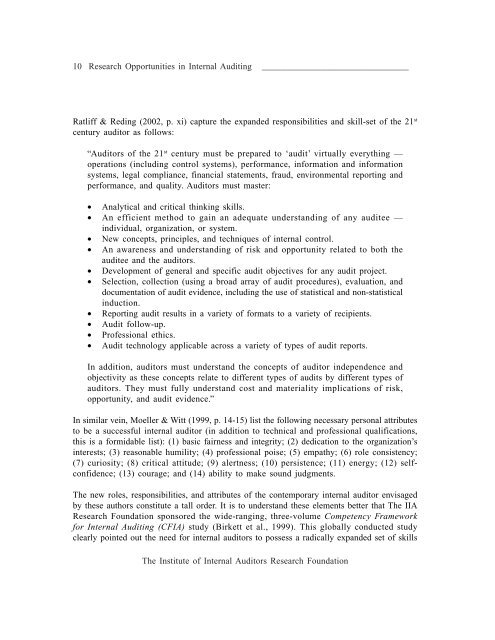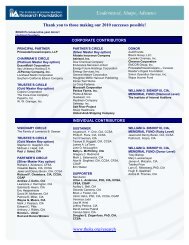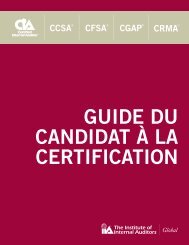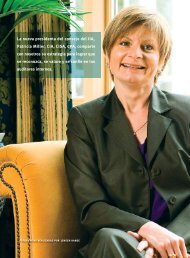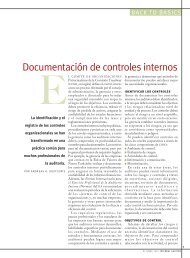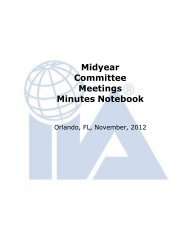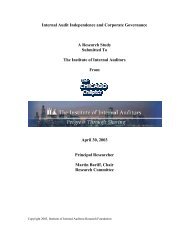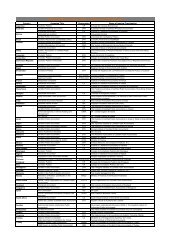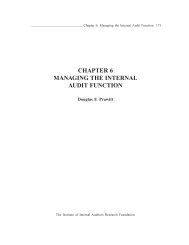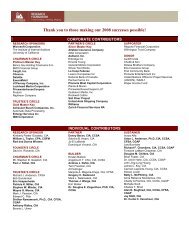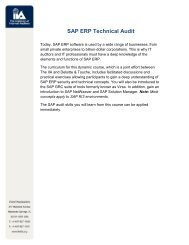Chapter 1.pmd - The Institute of Internal Auditors
Chapter 1.pmd - The Institute of Internal Auditors
Chapter 1.pmd - The Institute of Internal Auditors
Create successful ePaper yourself
Turn your PDF publications into a flip-book with our unique Google optimized e-Paper software.
10 Research Opportunities in <strong>Internal</strong> Auditing _________________________________<br />
Ratliff & Reding (2002, p. xi) capture the expanded responsibilities and skill-set <strong>of</strong> the 21 st<br />
century auditor as follows:<br />
“<strong>Auditors</strong> <strong>of</strong> the 21 st century must be prepared to ‘audit’ virtually everything —<br />
operations (including control systems), performance, information and information<br />
systems, legal compliance, financial statements, fraud, environmental reporting and<br />
performance, and quality. <strong>Auditors</strong> must master:<br />
• Analytical and critical thinking skills.<br />
• An efficient method to gain an adequate understanding <strong>of</strong> any auditee —<br />
individual, organization, or system.<br />
• New concepts, principles, and techniques <strong>of</strong> internal control.<br />
• An awareness and understanding <strong>of</strong> risk and opportunity related to both the<br />
auditee and the auditors.<br />
• Development <strong>of</strong> general and specific audit objectives for any audit project.<br />
• Selection, collection (using a broad array <strong>of</strong> audit procedures), evaluation, and<br />
documentation <strong>of</strong> audit evidence, including the use <strong>of</strong> statistical and non-statistical<br />
induction.<br />
• Reporting audit results in a variety <strong>of</strong> formats to a variety <strong>of</strong> recipients.<br />
• Audit follow-up.<br />
• Pr<strong>of</strong>essional ethics.<br />
• Audit technology applicable across a variety <strong>of</strong> types <strong>of</strong> audit reports.<br />
In addition, auditors must understand the concepts <strong>of</strong> auditor independence and<br />
objectivity as these concepts relate to different types <strong>of</strong> audits by different types <strong>of</strong><br />
auditors. <strong>The</strong>y must fully understand cost and materiality implications <strong>of</strong> risk,<br />
opportunity, and audit evidence.”<br />
In similar vein, Moeller & Witt (1999, p. 14-15) list the following necessary personal attributes<br />
to be a successful internal auditor (in addition to technical and pr<strong>of</strong>essional qualifications,<br />
this is a formidable list): (1) basic fairness and integrity; (2) dedication to the organization’s<br />
interests; (3) reasonable humility; (4) pr<strong>of</strong>essional poise; (5) empathy; (6) role consistency;<br />
(7) curiosity; (8) critical attitude; (9) alertness; (10) persistence; (11) energy; (12) selfconfidence;<br />
(13) courage; and (14) ability to make sound judgments.<br />
<strong>The</strong> new roles, responsibilities, and attributes <strong>of</strong> the contemporary internal auditor envisaged<br />
by these authors constitute a tall order. It is to understand these elements better that <strong>The</strong> IIA<br />
Research Foundation sponsored the wide-ranging, three-volume Competency Framework<br />
for <strong>Internal</strong> Auditing (CFIA) study (Birkett et al., 1999). This globally conducted study<br />
clearly pointed out the need for internal auditors to possess a radically expanded set <strong>of</strong> skills<br />
<strong>The</strong> <strong>Institute</strong> <strong>of</strong> <strong>Internal</strong> <strong>Auditors</strong> Research Foundation


